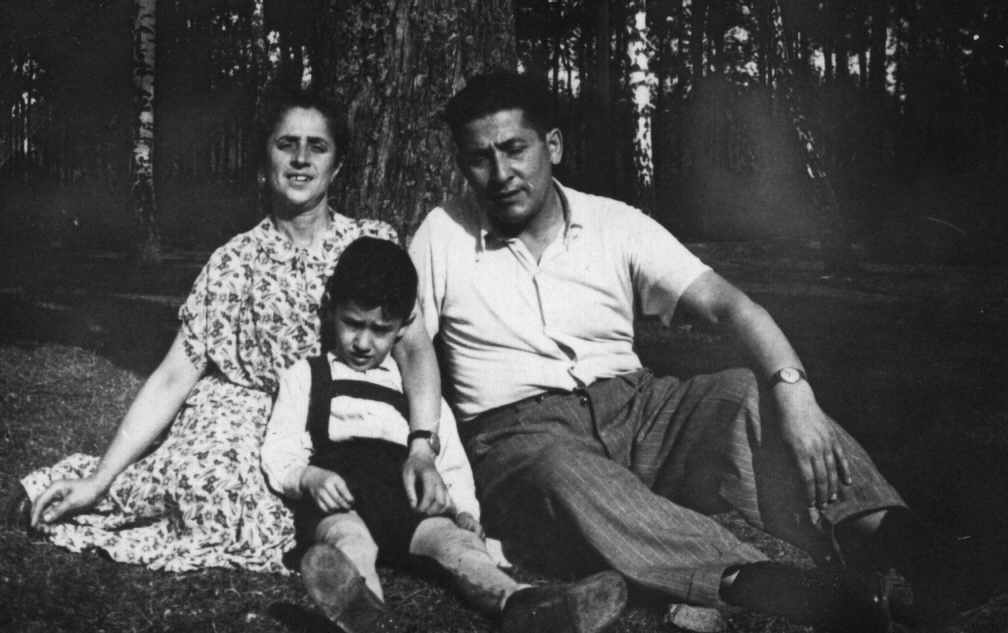
In Lodz I had many Jewish friends, most of them, like Abramek Checinski and Heniek Lichtenstein, also children of Holocaust survivors, living in the same apartment block at Jaracza 15, and some others, like the children of my parents' friends, living nearby. Despite the tragedy inflicted upon them, Poland was still the homeland of tens of thousands of Jews.
My mother had very good friends - "lager friends" who had survived the war in the same concentration camps, or whom she knew from before the war. Her friends, such as Lola Szydlowska and Chanka, shared my mother's love for literature. There was a lady I kne of as "Pani Zelazo" (Mrs Zelazo); there was a lady I knew of as "Nauczycielka" (the teacher)... My mother delighted in their company. My father, whose working profession as a clicker had never been one of the more "prestigious" occupations, also had his friends - friends generally from the same profession.

I was very good in the Polish language well before I started school in Poland. That was because I had my mother - with her huge scholastic knowledge - as a teacher. Although she would tell me about her life - her life before the war, her life during the war, her life when I was a baby - the good times as well as the bad - she would also acquaint me with literature, the arts, history and geography. After initially reading to me books such as "Poczytaj mi Mamo" ("Read to me Mother") readers as a toddler, I would advance to reading the books she read, such as Krylow's Fables, Julian Tuwim's writings and poems by Maria Konopnicka and Adam Mickiewicz, my mother discussing the subject matter with me. Because of my mother I knew what an eagle was, without ever having seen one; I knew what a desert, jungle or ocean was without ever having been there; I knew about other countries and their history; I had heard not only about Hitler, but also about Napoleon, Prince Henry Poniatowski, Julius Ceasar, Winston Churchill, President Roosevelt, and other historical figures. By the time I was nine years old I was reading Polish translations of English and other classics such as Jack London's 'White Fang', Mark Twain's 'Prince and the Pauper' and Jules Verne's 'The Children of Captain Grant' - a story of history, adventure and travel across Patagonia, New Zealand and Australia - Australia which was to become my home (I completed reading that book while on the aeroplane to Australia).
It was entirely thanks to my mother's education that I was able to speak Polish so well during my trip there in 1999.
"Your father was a 'poer' (peasant)!" my mother would tell me with some anger after their breakup when I was 18 years of age. She was referring to his trade and to his upbringing. And yet I have some recollections of my father which belie another side - a more cultured side. True, his knowledge of the Polish language was minimal, but that would have undoubtedly been due to the heavy emphasis on his Jewish Orthodox education as a youth. My father joined my mother in giving me practice arithmetic problems ("slupki", he called them in Polish). Also my father's love for music cannot be denied. It would have been nice to look into his past! Although he spent much of his time on his shoemaking machinery - heavy duty sewing machine in particular, we did enjoy each other's company, going to local eating places, and, with my mother, to cinemas.
I could give many examples of how tight my father was when it came to money. I have no doubt it stemmed from the Ghetto and his impoverished past. Despite that, there were some exceptions in his frugality. My father enjoyed good food, and we had the best of everything; we went on holidays every year during the summer break; I had many toys - it was almost definitely on my father's initiative that he bought me a "Bajka" film projector - a hand operated bakelite unit which showed cartoon and film slides, and with than came a number of films such as Snow White and some other interesting titles; I had an electric train set, a largish one, superbly made in Chechoslovakia. We bought one of the first electric refrigerators on the market - a Russian built Saratov model, and my father also bought one of the first portable radios - one with miniature valves, a Russian built Szarotka. Maybe my father liked gizmos...
I have particularly fond memories of my father joining us while holidaying in Ciechocinek, laden with "Jagodniki" - lush and juicy bilberry pies.
My father told me: "You can do anything with the right books and tools" and that statement profoundly influenced my life up to the present - by the time I was 60 I had done electronic and electrical repair, steel cutting and welding, bricklaying, concreting, carpentry, making furniture, plastering, and motor repairs, amongst other things. My wife Linette and I built a large house almost entirely by ourselves over a twelve year period. I have no doubt my father's wise statement provided me with the necessary encouragement.